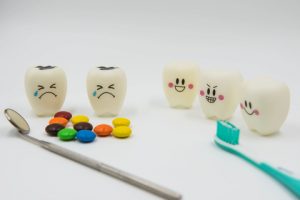What is Tooth Decay?
Tooth decay, also know as dental caries, is the most common dental disease. It is acid generated by bacteria that causes demineralization and decomposition of hard dental substances. Although at first, dental decay appears only on the dental enamel, in later stages, it can damage the dentin. Tooth decay is the main culprit when it comes to inflammation of the dental pulp, and the tissue around the tooth root.
What Causes Teeth to Decay?
Dental plaque bacteria play the biggest role in the development of dental caries. Wondering how this is so? Food that we consume daily begins its process of decomposition in our mouth. Our saliva and the surface of teeth consist of the previously mentioned bacteria in charge of food breakdown.
When we eat certain food like snacks and drink juices full of sugar, these bacteria are producing an acid that has the ability to destroy the hard tooth tissue. The higher the level of this acid, the higher is the chance of the occurrence of dental caries.
Bear in mind that if dental caries are not treated in time, it grows into dentin caries. Further spread of caries in the dentin leads to the destruction of the tissue in which the blood vessels and nerves are located, and this is the main reason why you may experience extremely unpleasant pain.
The Most Common Causes of Dental Caries:
- Improper tooth brushing technique: If teeth are brushed irregularly and incorrectly, doing so leads to plaque, and an increased number of bacteria on our teeth. Regular removal of food and drink deposits is the number one prevention against tooth decay.
- Fluoride deficiency: Lack of fluoride in toothpaste or mouthwash accelerates the demineralization process that leads to dental caries.
- Tooth arrangement and position: If your teeth are too close together, food particles stick in between teeth more regularly, and are harder to remove.
- Dry mouth: Saliva is a natural agent of rinsing the teeth. Whenever you eat and drink, saliva has the function of removing as much food and plaque as possible from your teeth. That is why you always need to drink enough water on a daily basis.
Other Risk Factors for the Progression of Dental Caries:
- Aging: Teeth that are older, develop plaque faster than younger teeth.
- Improper Diet : Consuming excessive amounts of drinks and foods that are acidic, starchy or sugary.
- Tobacco Products: Both smoking and the use of smokeless tobacco products increase the development of dental plaque, as well as, the acidity level of saliva.
- Diseases that Affect the Production of Saliva: Certain disease symptoms include dry mouth which is a known cause of dental caries.
- Gum Recession: Gum tissue that has receded and exposed more of the tooth, or even the root of a tooth, increases the risk of decay to the newly exposed area.
Diagnosis of Dental Caries
Your dentist and the entire dental office team will participate in dental caries diagnosis. The examination is performed by observing the tooth surface using probes, mirrors, lighting, etc. Keep in mind, that with your subjective observation, you can also help in diagnosing dental caries. You can do this by noticing any feeling of aching or pain in your teeth, noticing how sensitive your teeth are to different stimuli like temperature, and noticing any discomfort when chewing. It is often the case where the dentist will want to X-ray individual teeth or the entire jaw to support diagnosis.
Tooth Decay Treatment
Let’s make one thing crystal clear – tooth decay treatment is not a painful experience. The most common way to treat dental caries is to clean the tooth, and fill the resulting cavity with a replacement dental material.
If the dental caries are in an advanced stage but has not reached the nerve of the tooth, a medicine based on calcium hydroxy is used with the aim of regenerating the tooth. Unfortunately, if dental caries affect the dental pulp, the dentist will have to conduct a more pervasive dental procedure called a root canal. Although this treatment may sound uncomfortable at first glance, the pulp removal and replacing with inert material is a standard dental procedure.
How to Stop Teeth from Deteriorating?
 One way to prevent the occurrence of dental caries is to reduce the number of bacteria and plaque in the mouth. And the best way to achieve this is to brush your teeth regularly at least two times every day, and to use dental floss daily. Dental hygiene should become a regular habit of your everyday routine. You can also use antibacterial mouthwash solutions that successfully reduce bacterial levels, and neutralize the acid in your mouth.
One way to prevent the occurrence of dental caries is to reduce the number of bacteria and plaque in the mouth. And the best way to achieve this is to brush your teeth regularly at least two times every day, and to use dental floss daily. Dental hygiene should become a regular habit of your everyday routine. You can also use antibacterial mouthwash solutions that successfully reduce bacterial levels, and neutralize the acid in your mouth.
The bitter truth is that you will need to reduce your intake of sweets, juices, and all foods that are rich in sugar if you really want to protect your teeth. After consuming foods with a high percentage of sugar, the acid in our mouths increases in large quantities, which is one of the biggest culprits for tooth decay.
You could also lower the risk of developing dental caries by:
- Refraining from foods that are sticky and that stick in between teeth.
- Visiting the dentist routinely for examinations and professional teeth cleaning.
- Having the dentist apply dental sealants, or coatings to protect the teeth when recommended.
Tooth Decay Symptoms
At the very beginning of tooth decay, there are usually no symptoms. However, as time passes and this problem stays unsolved, dental caries continue to penetrate the deeper layers of the tooth, and can cause toothache, as well as, sensitivity to sweet, warm, or cold. If you neglect to solve this problem, the tooth can become infected, and pus may appear.
Dental caries can be noticed during regular check-ups at the dentist’s office. At an early stage, it may look like a white spot on a tooth. If it continues to spread, dark spots or ruptures in the tooth can become pretty big.
Probable Complications of Dental Decay
If dental caries and tooth decay are not treated in a timely fashion, more serious complications are likely to develop. These complications include:
- Tooth Sensitivity: Particular substances, and also temperatures create discomfort in teeth when experienced.
- Tooth Abscess: When bacteria penetrates the inside of tooth, resulting in an infection, accumulation of pus, and potential pain.
- Chewing Complications: Any pain or discomfort resulting from tooth decay is likely to be exaggerated while using the affected tooth to chew.
- Damage or Loss of Tooth: If dental decay is not treated properly, damage to the tooth will continue. At a certain point, the tooth will no longer be treatable, and will have to be removed.
- Dental Pain: What was once an ache and uncomfortable, will develop into greater pain until the matter is resolved properly.
- Dental Abscess: A serious bacterial infection similar to a tooth abscess, but where the infection has spread to other areas of the mouth. Dental abscesses are usually filled with an accumulation of pus, and generally painful.
The Takeaway
Tooth decay is a very common occurrence, and the vast majority of people encounter this problem sooner or later in life. Dental caries does not have to be dangerous if it is noticed, and treated in time. However, untreated dental caries can lead to health complications, more advanced dental problems, and new diseases.
The post Tooth Decay And Dental Caries Causes, Symptoms, Treatments appeared first on GQ Central.

Comments are closed